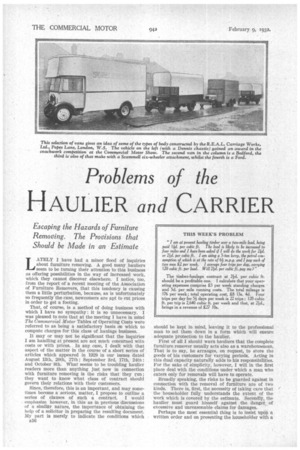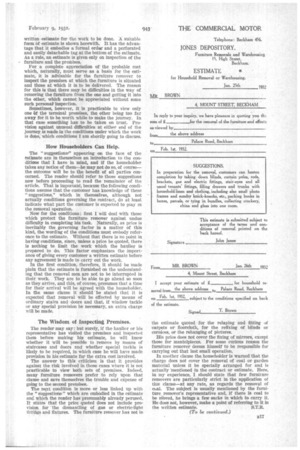Problems of the
Page 50

Page 51

If you've noticed an error in this article please click here to report it so we can fix it.
HAULIER and CARRIER
Escaping the Hazards of Furniture Removing. The Provisions that Should be Made in an Estimate
LATELY I have had a minor flood of inquiries about furniture removing. A good many hauliers seem to be turning their attention to this business as offering possibilities in the way of increased work, which they cannot discover elsewhere. I notice, too, from the report of a recent meeting of the Association of Furniture Removers, that this tendency is causing them a little perturbation, because, as is unfortunately so frequently the case, newcomers are apt to cut prices in order to get a footing.
That, of course, is a method of doing business with which I have no sympathy : it is so unnecessary. I was pleased to note that at the meeting I have in mind The Commercial Motor Tables of Operating Costs were referred to as being a satisfactory basis on which to compute charges for this class of haulage business.
It may or may not be significant that the inquiries I am handling at present are not much concerned with costs or with prices. In any case, I dealt with that aspect of the matter in the course of a short series of articles which appeared in 1929 in our issues dated August 13th, 20th, 27th; September 3rd, 17th, 24th: and October 8th. What seems to be troubling hauler readers more than anything just now in connection with furniture removing is the risks that they run ; they want to know what class of contract should govern their relations with their customers.
Since, therefore, this is an important, and may sometimes become a serious, matter, I propose to outline a series of clauses of such a contract. I would emphasize however, in this as in previous discussions of a similar nature, the importance of obtaining the help of a solicitor in preparing the resulting document. My part is merely to indicate the conditions whicb n16 should be kept in mind, leaving it to the professional man to set them down in a form which will ensure adequate protection to the haulier.
First of all I should warn hauliers that the complete furniture remover usually acts also as a warehouseman. That is to say, he arranges, on request, to store the goods of his customers for varying periods. Acting in this dual capacity naturally adds to his responsibilities. For the sake of simplicity, however, I will in the first place deal with the conditions under which a man who caters only for removals will have to operate.
Broadly speaking, the risks to be guarded against in connection with the removal of furniture are of two kinds. There is, first, the necessity of taking care that the householder fully understands the extent of •the work which is covered by the estimate. Secondly, the haulier must guard himself against the danger of excessive and unreasonable claims for damages.
Perhaps the most essential thing is to insist, upon a written order and on presenting the householder with a written estimate for the work to be done. A suitable form Of estimate is shown herewith. It has the advantage that it embodies a formal order and a perforated and easily detachable tag at the bottom of the estimate. As a rule, an estimate is given only on inspection of the furniture and the premises.
For a complete appreciation of the probable cost which, naturally, must serve as a basis for the estimate, it is advisable for the furniture remover to inspect the premises at which the furniture is situated and those at which it is to be delivered. The reason for this is that there may be difficulties in the way of removing the furniture from the one and getting it into the other, which cannot be appreciated without some such personal inspection.
Sometimes, however, it is practicable to view only one of the terminal premises, the other being too far away for it to he worth while to make the journey. In that case something has to be taken on trust. Provision against unusual difficulties at either end of the journey is made in the conditions under which the work is done, which conditions I am shortly going to discuss.
How Householders Can Help.
The " suggestions" appearing on the face of the estimate are in themselves an introduction to the C011ditions that I have in mind, and if the. householder takes any notice of them—he may not do so, of course— the outcome will be to the benefit of all parties concerned. The reader should refer to those suggestions now before proceeding to read the remainder of the article. That is important, because the following conditions assume that the customer has knowledge of these "suggestions," which in themselves, although not actually conditions governing the contract, do at least indicate what part the customer is expected to play in the removal operation.
Now for the conditions: first I will deal with those which protect the furniture remover against undue difficulty in completing his task. Naturally, as price is inevitably the governing factor in a matter of this kind, the wording of the conditions must embody reference to the estimate. Without that there is no point in• having conditions, since, unless a price be quoted, there is nothing to limit the work which the haulier is prepared to do. This factor emphasizes the importance of giving every customer a written estimate before any agreement is made to carry out the work.
In the first condition, therefore, it should be made plain that the estimate is furnished on the understanding that the removal men are not. to be interrupted in their work. They are to be able to go ahead so soon as they arrive, and this, of course, presumes that a time for their arrival will be agreed with the householder. In the same clause it should be stated that it is expected that removal will be effected by means of ordinary stairs and doors and that, if window tackle or any special provision be necessary, an extra charge will be made.
The Wisdom. of Inspecting: Premises.
The reader may say: but surely, if the haulier or hie representative has visited the premises and inspected them before making his estimate, he will know whether it will be possible to remove by means of staircases and doors and whether special tackle. is likely to be required, in which case he will have made provision in Ids estimate for the extra cost involved.
The answer to this criticism is that it provides against the risk involved in those cases where it is not practicable to view both sets of premises. Indeed, many furniture removers prefer to rely upon that clause and save themselves the trouble and expense of going to the second premises.
The next condition is more or less linked up with the "Suggestions-" which are embodied in the estimate end which the reader has presumably already perused'. It states that the price quoted does not include provision for " the dismantling of gas or electric-light fittings and fixtures. The furniture remover has not in
the estimate quoted for the relaying and fitting of carpets or floorcloth, for the refixing of blinds or cornices, or the rehanging of pictures.
His price does not cover the fixing of mirrors, except those for mantelpieces. For some curious reason the furniture remover deems himself to be responsible for carrying out that last small operation.
In another clause the householder is warned that the charge does not cover the removal of coal or garden material unless it be specially arranged for and is actually 'mentioned in the contract or estimate. Here, in my experience, 1 should state that few furniture removers are particularly strict in the application of this clause--at any rate, as regards the removal of (mid. The subject is usually mentioned by the furniture remover's representative and, if there is coal to be 167:wed, he brings a few sacks in which to carry it. He does not, however,, make a point of referring to it in
the written estimate. S.T.R. (To be continued.)




























































































